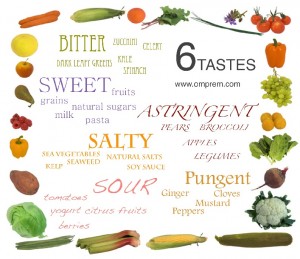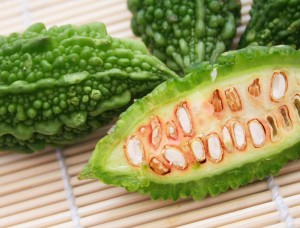
The bitter taste in Ayurveda is known in Sanskrit as tikta rasa. It is one of the shad rasa or 6 tastes in Ayurveda. Bitter is comprised of the elements of air (vayu) and ether (akasha). The bitter taste in Ayurveda increases Vata dosha and decreases Pitta and Kapha doshas. In terms of virya or energetic effect, katu rasa is cooling. The vipak or post digestive effect of bitter is pungent. With regard to gunas or qualities, it is dry, cold, and light.
In America, we have negative connotations with the word “bitter”. We use expressions such as “a bitter pill to swallow” or “left a bitter taste in my mouth” or “don’t be so bitter”.
One of the best parts of my studying at the Ayurvedic Institute with Dr. Vasant Lad was his teaching style. He would quote memorable aphorisms that have stayed with me throughout the years. One of these enduring sayings was, “Bitter it better”. I’ve really come to appreciate the wisdom behind these words.
Some examples of bitter foods and herbs are bitter melon, coffee, aloe, dandelion, echinacea, golden seal, rhubarb, neem leaves, endives, lettuce, bitter greens, and turmeric root. High quality dark chocolate also has a bitter taste. I also fondly recall Dr. Robert Svoboda regularly sharing dark chocolate with the staff members of the Ayurvedic Institute. This was before the American public knew the benefits of dark chocolate, but obviously he was well aware of this fact. Over time, it became an acquired taste for me.
The bitter taste in Ayurveda has a myriad of health benefits. Bitter is detoxifying, anti-inflammatory, and anti-bacterial. Bitter purifies the blood, detoxes the body, and has an antibiotic, antiseptic, and antipyretic effect. Bitter also acts as a liver tonic; bitter foods and herbs are used to relieve liver imbalances.

The bitter taste relieves fainting, itching, burning sensations, and skin inflammation. It creates tightness of the skin and muscles. The bitter taste in Ayurveda kindles the digestive fire or the agni, and thus improves appetite and digestion. Katu rasa helps scrape fat from the body (lekhana), and aids in the removal of tumors from the body. It also cleanses the bodily tissues or the sapta dhatu. It is cleansing and keeps the skin firm.
As Ayurveda teaches us that we must use all things in moderation, we have to be careful not to overdo the use of any one taste. Since bitter is also rough and clear in terms of gunas, excess use of the bitter taste leads to depletion of the bodily tissues, especially the reproductive tissues (shukra dhatu). It can cause weakness, emaciation, weariness, dryness of the mouth, and dizziness.
On a psychological level, the bitter taste leads to clarity in mental thinking, Used excessively, it can lead to dissatisfaction, isolation, grief, worry, mental agitation, spaciness, and loneliness.
Ayurveda advises that we eat correctly for our current Ayurvedic state of imbalance or vikruti. This is particularly important during the holidays when we can tend to indulge. A personalized Ayurvedic consultation can be ideal for yourself or a friend or family member.